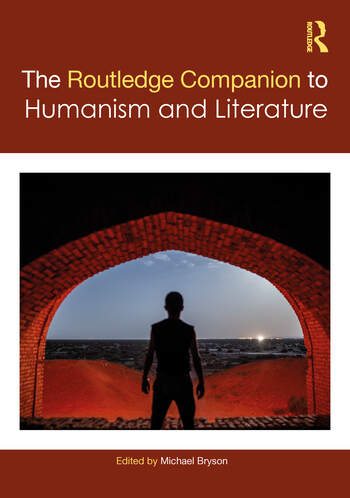 |
My newest book is
an edited collection,
The Routledge Companion to Humanism and Literature, which
provides readers with a comprehensive reassessment of the value of
humanism in our current intellectual landscape. While the value of
humanism has recently been dominated by anti-humanist and posthumanist
perspectives which focused on the flaws and exclusions of previous
definitions of humanism, this volume examines the human problems,
dilemmas, fears, and aspirations expressed in literature, as a
fundamentally humanist art form and activity. Divided into three
overarching categories, this companion will explore the histories,
developments, debates, and .contestations of humanism inliterature, and
deliver fresh definitions of "the new humanism" for the humanities.
This focus aims to transcend the boundaries of a world in which human
life is all too often defined in terms of restrictions-political,
economic, theological, intellectual-and lived in terms of obedience,
conformity, isolation, and fear |
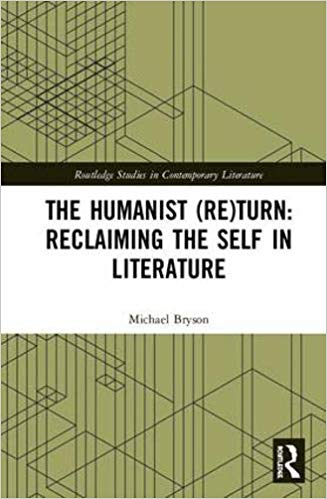 |
My
previous book project,
The
Humanist (Re)Turn: Reclaiming the Self in Literature
(Routledge, 2019), argues for a renewed emphasis on
humanism—against “the anti-humanism” of the last
several decades of literary/theoretical scholarship,
from the decentering of the author in Mallarmé,
Barthes, and Foucault, to the fragmented—even
disappearing—subject of Frederic Jameson, to the
“posthuman” perspectives of critics like Donna
Haraway, Richard Grusin, Rosa Braidotti, and others
whose work emphasizes the decentering of the human in
favor of a turn toward the nonhuman, whether
understood in terms of animals, affectivity, bodies,
organic
and geophysical systems, materiality, or technology.It takes as its frame the idea of
transcendence, specifically in terms of what Pierre Teilhard de
Chardin calls a retournement dans l'Autre [return (in)to the
Other], and what Carl Jung refers to as individuation. In
each case, the dynamic is a turn toward the Other (without or within). Through this
paradigm, the book deals with literature from Europe, Asia, and the United States, including the
Bhagavad Gita, Chaucer's Troilus and Criseyde,
Marlowe's Dido: Queen of Carthage, Shakespeare's Othello,
Goethe's Faust, Richardson's Clarissa, Austen's
Pride and Prejudice, Brontë's Jane Eyre, Eliot's
Silas Marner, and O'Connor's Wise Blood. |
|
|
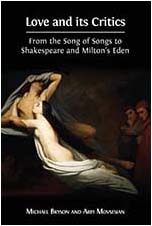 |
Love and its
Critics (Cambridge: Open Book, 2017), written with
Arpi
Movsesian, is a history of love and the challenge love offers to the
laws and customs of its times and places, as told through poetry from
the Song of Songs to Ovid and Virgil, the Greek writers Longus and
Musaeus, the Occitanian troubadours, the Italian poets of the
thirteenth- and fourteenth-centuries, the poems and plays of
Shakespeare, the poems of John Donne and Robert Herrick, and John
Milton’s Paradise Lost. It is also an account of the critical
reception afforded to such literature, and the ways in which criticism
has attempted to stifle this challenge. Love and its Critics argues that
the poetry it explores
celebrates and reinvents the love the troubadour poets of the eleventh
and twelfth centuries called
fin’amor: love as an end in itselfmutual and freely chosen even
in the face of social, religious, or political retribution. Neither eros nor
agape, neither exclusively of the body, nor solely of the spirit, this
love is a middle path. Alongside this tradition has grown a critical
movement that employs a 'hermeneutics of suspicion', in Paul Ricoeur’s
phrase, to claim that passionate love poetry is not what it seems, and
should be properly understood as worship of God, subordination to
Empire, or an entanglement with the structures of language itself – in
short, the very things it resists. |
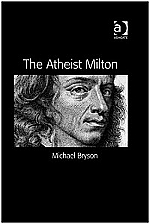 |
The Atheist Milton
(Ashgate, 2012 / Routledge 2016) argues that Milton was an Atheist by
the commonly-used definitions of the period.
“Atheism” meant different things in Milton’s day than it
does for us today. Essentially, the word has become narrower in scope
for us, less flexible in its capacity to carry shades of meaning.
“Atheist” tends to mean one thing today: someone who does not believe
in God. In Milton’s time, the term “Atheist” was used in a much more
wide-ranging way: it could refer to someone who did not believe that
God existed, but more commonly it referred, not to unbelief, but to
variations in belief that were regarded by
the accuser (and the word is almost always an accusation rather than a
self-chosen label) as straying from orthodox belief, what I refer to
in the book (with all due irony) as correct belief as opposed to the incorrect
belief of the “atheist.”
My argument is
two-fold: based on his association with Arian ideas (denial of the
doctrine of the Trinity), his argument for
the de Deo theory of creation (the idea that the universe is
created, not from nothing or ex nihilo, but from the essence of
God, which puts him in line with the materialism of Spinoza and
Hobbes), and his Mortalist argument that the human soul dies with the
human body, Milton was an Atheist by the commonly-used definitions of
the period. And as the poet who takes a reader from the presence of an
imperious, monarchical God in Paradise Lost, to the internal--almost
Gnostic--conception of God in Paradise Regained, to the absence of any
God whatsoever in Samson Agonistes, Milton is the poet of the
Atheists, pushing harder against that old “task-Master” than any poet
before or since. |
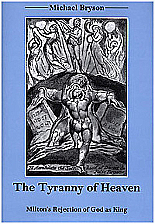 |
My research and teaching
often focuses on questions of authority and its
construction. I have special interest in how those questions and
constructions are manifested in the early modern era, but my interest
(even passion) transcends period. My first book,
The
Tyranny of Heaven: Milton’s Rejection of God as King (U.
Delaware Press, 2004), focuses this interest on John Milton and the English 17th
century, a place and time in which questions of freedom and authority
eventually brought a nation to revolution, civil war, and a failed
attempt to permanently overthrow a centuries-old tradition of
monarchical government. |
In my non-academic life, I am a guitarist and poet. I have recently
released two projects encompassing these sides of my overall work:
|
| | | | |